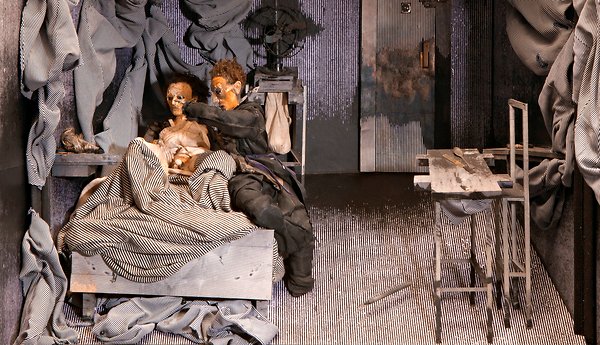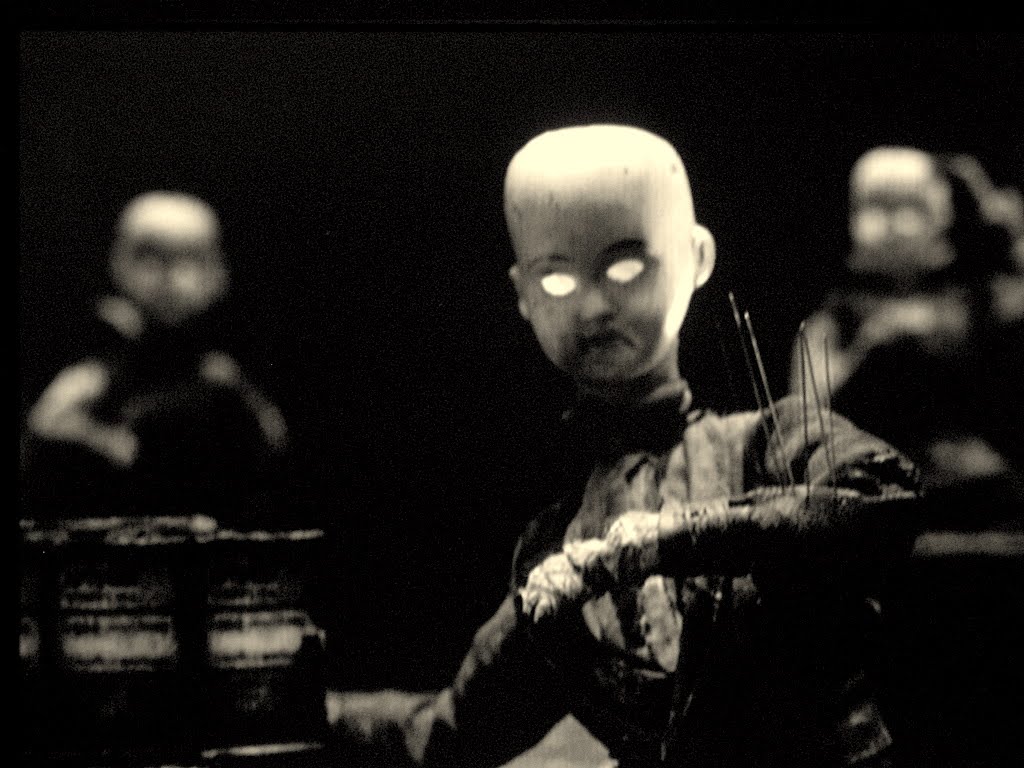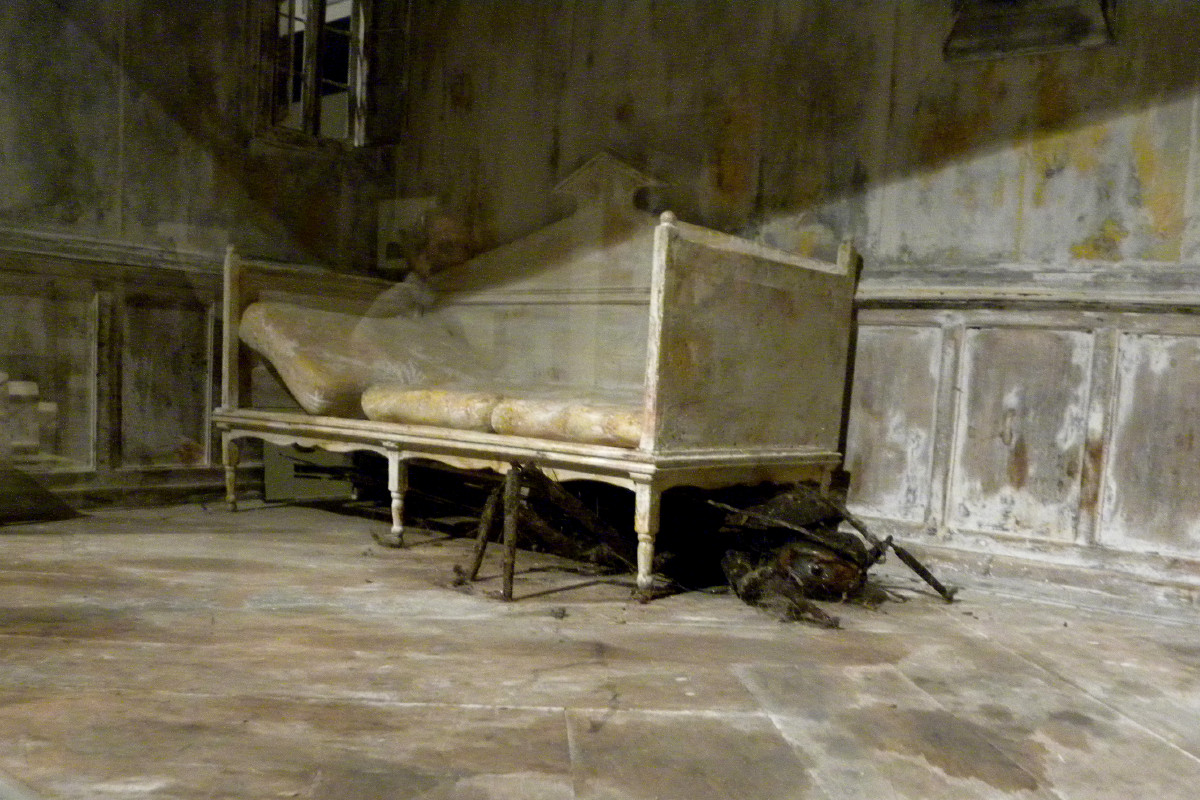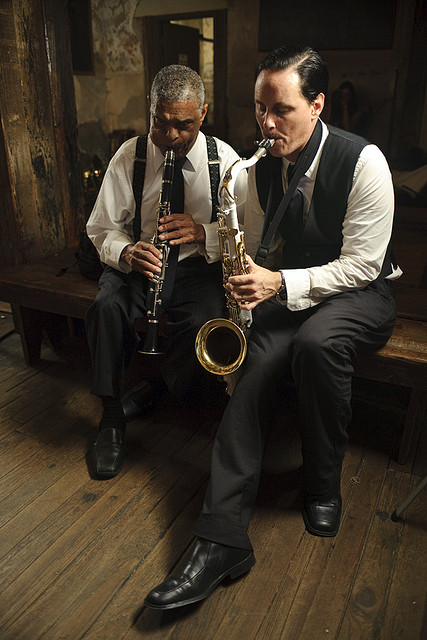Monday brought us to the Museum of Modern Art for the final day of their exhibit, “Quay Brothers: On Deciphering the Pharmacist’s Prescription for Lip-Reading Puppets.” This retrospective of the twin brothers’ 40 year career creating some of the most iconic and beautiful animated films in existence. We’ve both been fans for some time, X and I, but never thought we’d get to see something like this. This exhibit was the catalyst for the trip, to be perfectly honest.
It would be impossible to explain the Quay’s work in any way that would convey the beauty and magic of it, so best to send you off to search for some of it on YouTube and the like. That’s okay, do it now, we’ll wait…
Welcome back. This exhibit was quite thorough, featuring about 20 of the miniature sets used in making the films, as well as models and sketches, 2D artworks, such as a Blood, Sweat & Tears album cover produced long ago (who’d’a thought?) and reels of the short films and commercial work, such as Peter Gabriel’s Sledgehammer. Some longer work was shown in its entirety, such as their most famous work, Street Of Crocodiles, based loosely on the Bruno Schultz book. There were separate screenings, in Theater I, of the new The Metamorphosis, based on the Franz Kafka work.
We spent about 2 hours in the exhibit, enjoying it greatly, and after a brief sojourn to the book store (50% off sale!) and acquiring tickets to the 4:30 showing of Metamorphosis, repaired to the flat for a well earned nap.
Back uptown for the film. It was not just a simple screening, but featured live piano accompaniment by Mikhail Rudy. Here’s the museum’s description:
…these screenings of The Metamorphosis by Franz Kafka mark the North American premiere of the Quay Brothers’ newest film. Commissioned by Russian-born French pianist Mikhail Rudy in affiliation with Cité de la musique in Paris, where it premiered last March, the film is screened with live piano accompaniment by Rudy, performing the music of Czech composer LeoÅ JanáÄek.
The accompaniment was fabulous, and the film good (but repetitive and obtuse in places) but the entire experience was more than this, as it really delivered a sense of completeness to the exhibit and our experience of it.
We drifted across town and back down to Chelsea for our evening’s entertainment, Crescent City Stomp, a performance of the Preservation Hall Jazz Band at the McKittrick Hotel. First, though, a quick stop in at Son Cubano for a cocktail (quite good). The McKittrick is the fictional hotel which serves as host for Punchdrunk/Emursive’s production, Sleep No More. This environmental non-performance experience, based upon Shakespeare’s Macbeth, has been packing ’em in since early in 2011. Our show was in a new space, a speakeasy separate from the performance space used by SNM, on the west end of the warehouse block.

Served alongside the New Orleans riffs of PHJB was a menu of light appetizers and cocktails inspired by the Crescent City. We sampled most of the menu (having expected a proper meal here), and had wonderful corn bread, crisp muffalata croquets with tappanade, fried hominy, Brussles sprouts with pancetta and pomegranate seeds and shrimp-stuffed deviled eggs. Yum to all!
The music was stomping all right, the septet (piano, drums, tuba, saxophone, clarinet, trumpet and trombone) was tight, upbeat and having a good old time. The two sets, about 50 minutes each, were followed by a 2 song encore, by which time many of the tables had been pushed back and the floor was hopping.
The hall holds about 275 people and was full to the gills. There are an assortment of tables, from a dozen or so deuces arrayed around the stage (centered against one long wall), then 3 and 4 tops, and then larger tables and banquettes for 6 & 8. The bar fills one of the short walls of the room, and is well appointed with a good choice of liquors, liqueurs, wines and beers. Table service is fast and entertaining, the waiter and waitresses all embracing the roles of working a speakeasy.
The musicians were a treat to watch. The trumpeter, Mark Braud, looks like a more corpulent and dissolute Marsallis cousin, and belts out some grand vocals, too. The clarinetist, Charlie Gabriel, carries the aire of the old man of the troupe, while delivering some fine tunes and song. But our favorite was Clint Maedgen on tenor sax and vocals. His saxophone is painted white with fine black detailing, his hair slicked back, he could be Crispin Hellion Glover‘s louche and wayward younger brother.
All in all a fabulous night out!




